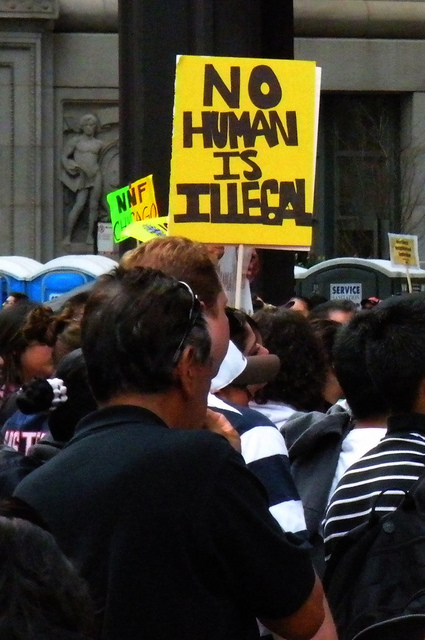Tracing The Shifting Meaning Of ‘Alien’

*This is the kind of “inside baseball” that I know many Taquistas enjoy discussing. I like these stories because they add context to a larger debate, in this case the language of immigration – “anchor babies,” and “illegal aliens.” Those terms, and that particular language have evolved. It wasn’t too long ago that “illegal” was a preferred term, and among many Latinos along the U.S. border the word “mojado” is used with ubiquitous ease. Adrian Florido says that the use of these terms is a “deliberate choice of key political players.” Thoughts?
![]() By Adrian Florido, Code Switch
By Adrian Florido, Code Switch
Republican presidential candidate Donald Trump repeatedly referred to “criminal aliens” and “illegal aliens” in the immigration plan he released on Sunday. “Alien,” and especially “illegal alien,” have become such staples in the vocabulary of conservative pundits and politicians that many immigrant rights advocates now reject those terms as derogatory and dehumanizing.
[pullquote][tweet_dis]The terms that dominate public immigration debates result from the deliberate choices of key political players. These choices sometimes have unintended consequences.[/tweet_dis][/pullquote]But it wasn’t always like that.
Take this excerpt from a letter that a group of Mexican-American law students wrote to the editor of the Los Angeles Times in 1970. They sent it after the paper ran an editorial with a headline that included the term “wetback.”
“We are still faced with insensitive and racist terms, such as wetback, to refer to Mexican nationals who have entered the country illegally,” the students wrote, “and we are now educating the public to use terms like illegal aliens or illegal entrants.”
The language of immigration was shifting, as it had several times before the students wrote that letter, and as it has several times since. According to an analysis by University of California Berkeley sociologist Edwin Ackerman, within a few years of that letter, “illegal alien” had indeed become the preferred term for major newspapers. It largely replaced “wetback,” which dominated during the 50s and 60s, and which itself had displaced “undesirables,” a popular Depression-era term.
Click HERE to read the full story.
[Photo by John W. Iwanski/Flicikr]

